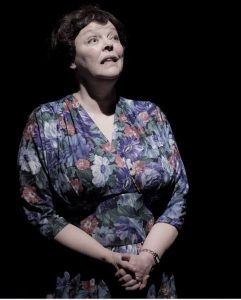REVIEW: Pack of Lies by Hugh Whitemore
 Pack of Lies is the true story behind how an ordinary Canadian couple, the Krogers, living in London, were exposed by MI5 as Russian spies. Set in a house directly opposite the Krogers’ residence, the Jackson family are visited by MI5, whose agents discreetly observe a mysterious visitor, to slowly reveal sinister activities taking place behind the Kroger’s front door. The presence of MI5 and realisation of the Kroger’s true purposes place great strain upon the Jacksons, whose lives are never the same again.
Pack of Lies is the true story behind how an ordinary Canadian couple, the Krogers, living in London, were exposed by MI5 as Russian spies. Set in a house directly opposite the Krogers’ residence, the Jackson family are visited by MI5, whose agents discreetly observe a mysterious visitor, to slowly reveal sinister activities taking place behind the Kroger’s front door. The presence of MI5 and realisation of the Kroger’s true purposes place great strain upon the Jacksons, whose lives are never the same again.
An excellent set, featuring the Jacksons’ lounge, kitchen and hallway, with period furniture and props was worthy of considerable merit. Add to this many great performances, tasteful lighting, good direction and authentic costumes, the resulting production generated a fine thriller, without a fight, gunshot or murder.
Pivotal to the escalating tension were Bob and Barbara Jackson (Bill Allender and Mary Campbell) and daughter Julie (Katie Clifton). All three actors performed their roles with great control, gradually alienating from one another as events slowly reveal how little they know about their friends. Mary Campbell, in particular, delivered a stellar performance as the strain of events took control over her life, frustrated further by her attempts to maintain normality whilst in the presence of the Krogers, either over coffee or at Christmas.
Philip Blurton was equally convincing as Stewart, a steely civil servant, whose job is never truly revealed. Stewart’s many visits to the house during the ongoing surveillance slowly reveal a human side to his character, though his presence and those of his “girls”, Thelma and Sally, (Sophia Bick and Mary Hooper) increase the tension and question if the Jacksons are also under observation.
The vivacious Helen Kroger (Sally Ann Lycett) balanced by her reserved husband Peter (Andrew Turner) create an interesting couple masking sinister secrets. Several tense moments occurred during ordinary social occasions between the two couples, particularly when Helen detected changes in Barbara’s domestic routines and discreetly probed into the reasons for these, mercilessly adding to Barbara’s escalating pressures.
Praise too to the backstage crew, who changed many props in darkness and total silence whilst the spotlight-lit soliloquys were being delivered. Like MI5 spooks, we never knew they were there.
Whereas slightly faster pace would have paid extra dividends, this play nevertheless showed the talent of the director, Carol Hunt, and was another excellent production, clearly enjoyed by the audience.
Andrew White
























